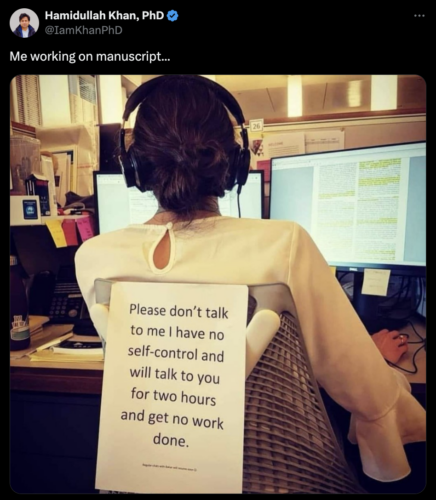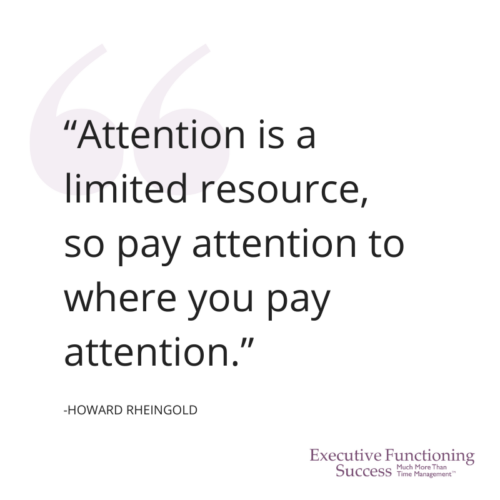Sustained attention, or the ability to stay focused on a task, is an executive function that people seem to, well… focus on!
Adult clients tell me that they need to improve their focus at work. Teachers complain about students who don’t focus in class. Everyone is looking for the magic wand to fix this frustrating problem. Alas, there is no magic wand.
Lack of sustained attention is frustrating because the ability to focus is very complex. It is tied to so many aspects of the brain and environment.
For those with ADHD, a chemically under-activated brain is one source of the lack of focus. That’s why stimulant medications can be helpful. Medication can make it easier to sustain attention, but doesn’t necessarily solve issues of starting and staying on task, especially when there is resistance to doing the task.
Working Memory and Task Initiation
My personal challenge with staying focused and on task is tied to my poor working memory. If a task pops into my mind or sight that I don’t want to forget, I will want to switch tasks immediately so that I don’t lose the thought.
The environment we work and live in can also make sustained attention very difficult. Our digital devices are full of potential distractions – very appealing when we want to avoid a task!
Interruptions from other people, at work, school and home can undermine the best of intentions to stay on task. And the states of our physical body and emotional brain also impact focus.
Inadequate sleep and lack of food at appropriate times diminish all of our executive functions including sustained attention. The same applies to experiencing an illness. I am just recovering from a cold virus during which I could not maintain focus on much of anything. If you are in a time of emotional stress, sustained focus will suffer.
Tips for Improving Focus and Working Memory
While there is no magic wand to ensure sustained attention, it can be improved. You can start by analyzing the situations where focus is difficult. What can you begin to change?

Manage Sustained Attention Through Brain Chemistry
- Medication: Many brains with ADHD positively respond to stimulant medications. The book: ADHD 2.0 by Hallowell and Ratey has an excellent section on medications. The websites for CHADD and ADDitude Magazine are also good reference sources for information on ADHD medications.
- Sleep: Take an honest look at your sleep hygiene. How can you improve it?
- Nutrition: Are you skipping meals? Living on junk food and excessive carbohydrates? How can you improve your eating habits?
- Emotional stress: Get help with problem-solving. Seek out counseling. What are your major stressors? Pick one and analyze what needs to be adjusted. Consider meditation and yoga classes. Set up walk and talks with a friend who is a positive person to be around.
- Exercise: Exercise changes your brain chemistry and can help focus. If you aren’t exercising, then reframe/rethink exercise. What your body and brain need is MOVEMENT. What kind of movement are you willing to add to your week? Start small and celebrate any movement!

Ways to Limit Digital Distractions to Boost Sustained Attention
- Declutter: Clean up your phone’s home screen and your computer desktop. Turn off notifications. Move tempting apps to the second screen. Consider getting rid of some.
- Silence notifications: When you need to work in a focused manner, put your phone on silent and move it out of your sight and reach.
- Set personal limitations: Decide when you will be on your phone and when you need to put it in “phone jail” for a bit. Check out Internet Blockers if you just can’t say no to tempting sites. You can set blocks for periods of time when you need to focus while on a computer.
Ways to Limit “People Distractions”
- Set boundaries both at work and home. If you need uninterrupted desk time, set up a system that communicates at a glance that you do not want to be disturbed. My clients have successfully used color-coded cards to hang on office doors or chairs. Green means I am open to interruptions. Red means do not disturb.
- Get Lost: Find a location where you are out of sight. People find all kinds of creative hiding spots in coffee shops, empty meeting rooms, and even their cars.
 Finding Motivation for Undesirable Tasks
Finding Motivation for Undesirable Tasks
- Mindset: Change your mindset from completion to making progress.
- Work smarter, not harder: Analyze when your brain works most efficiently and tackle harder tasks during those hours.
- Stay curious: Collect data on how long your brain can typically focus. Work for that period setting a timer for a 5-minute brain break. Then return to the task to make more progress.
- Positive reinforcement: Celebrate ALL of your progress, no matter how small. Celebration changes your brain chemistry and sustains motivation.
- Physical Environment: The disorder of your work/home space can be highly distracting. Taking time to keep your space tidy can be extremely helpful. This falls under the executive function category of Organization – a topic for another blog!
In the meantime, beware of how complicated it is to support sustained attention. It will ebb and flow in response to all of the issues above. No brain can be “on” all the time. Be kind to yourself. Start small. Identify one or two areas where you can make change to support your focus.
Then, CELEBRATE! You can do this. Then tackle another small achievable change to help yourself. We can all make changes to improve our executive functioning. I can do it. I’ve seen hundreds of others do it too.
Little by little, change happens.


